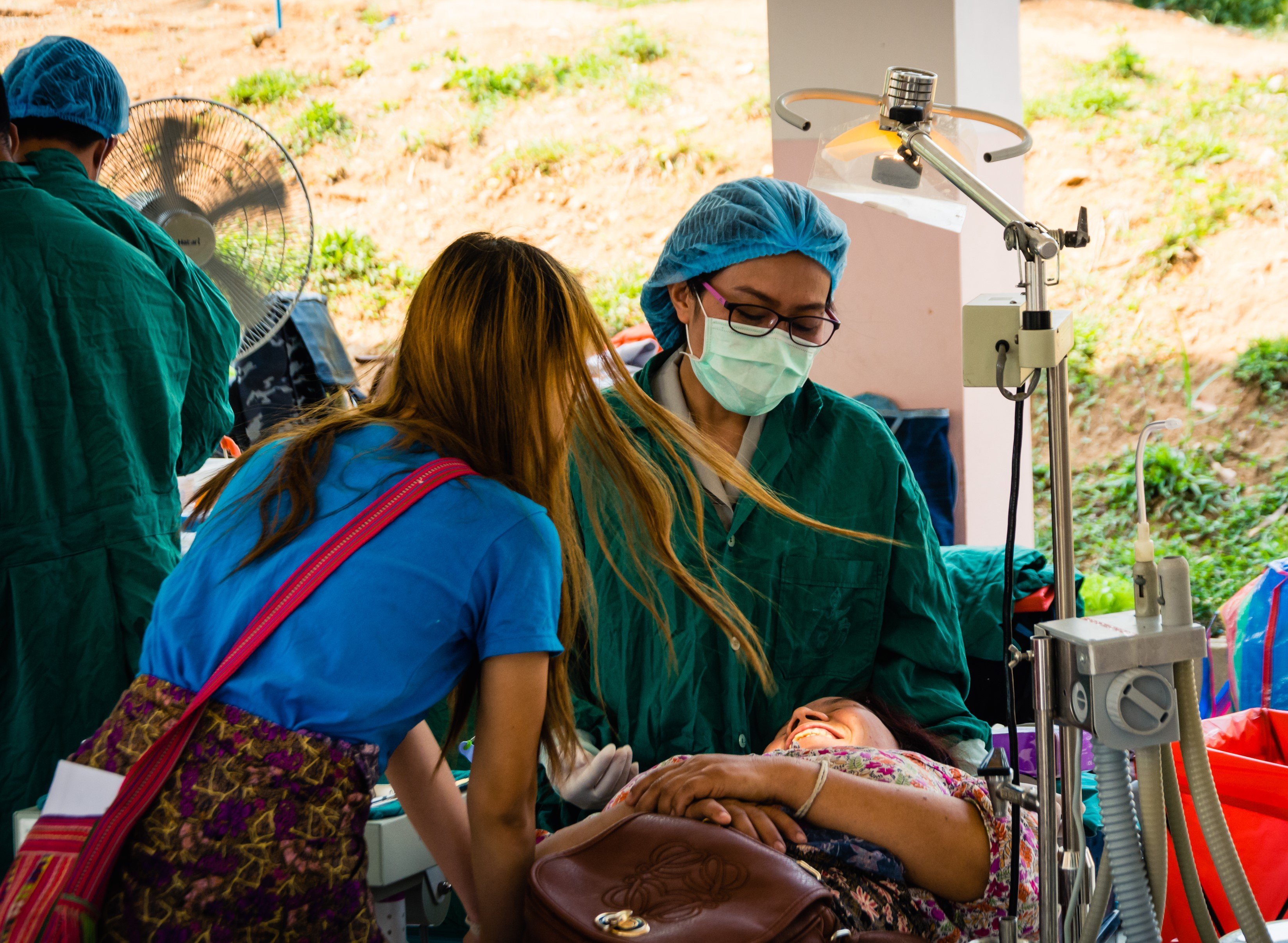There is only one guarantee in research: sometimes things fail. It doesn’t matter what your major is, how much experience you have, or whether your research is basic, applied, clinical, or translational. A research project will test your reliance, discipline, motivation, and, at times, it might make you feel like giving up. However, when your project hits a wall (and most do at some point), how you handle the disappointment is the key to your future success. Your reaction will also influence your labmates and how much help they will offer to get you back on track.
Unfortunately, some undergrads let their frustration get the better of them when faced with failure in the lab. Not only does this make their experience less rewarding, but it’s unpleasant for the other lab members, and that can lead to unintended consequences for the undergrad.
students
Five Ways to Make Your Audition Rotation in Anesthesia (or Other Specialty!) a Success
It is that time of year again. Medical school students across the country are preparing applications for residency and pursuing audition rotations at residencies they are hoping to woo into an interview and hopefully to match into their program.
Any audition rotation is a challenge. This is especially true for the anesthesia audition rotation. For medical school students who look great on paper, the audition rotation can either confirm they are a great candidate or confirm the program should not interview/rank them. For medical school students who do not have a stellar record, the audition rotation can open up doors.
Chronicles of a Med Student: Drinking from a Fire Hydrant
For the past several years, I felt like all I heard was everyone in medical school telling me how hard it is. I was a little worried, especially since I took a year off of school. How would I have the capacity to study anymore? Heck, I was used to spending my weekends and evenings lazing around, watching TV, and overall doing as I pleased. And now all of a sudden, I was expected to sit with my feet bolted to the floor staring at a computer screen with words like infundibular recess screaming at me for 9 hours a day. There was no way. All kinds of thoughts crossed my mind: I would lose all of my friends, gain weight from sitting around all day, and generally go insane.
What I Learned During My First Semester of Medical School
Students will feel a variety of emotions during the weeks and days leading up to the start of medical school, ranging from excitement to anxiety. Below are five key things I learned during my first semester in medical school, some of which I wish I had known before I began:
1. Every student is unique, so do what works best for you
Many people equate the preclinical years of medical school to standing before a water hose and attempting to drink all of the water that pours from it. The vast amount of information that you will be exposed to may seem overwhelming at times, but it is important to remember that generations of physicians have successfully completed their medical training. There is a way to manage this wealth of information.
How to ace your first patient encounter
As a medical student, you spend four years of college and the first two years of medical school studying non-stop for what feels like thousands of hours, cramming your brain with knowledge. But when the time comes to conduct your first face-to-face patient encounter, your confidence is rocked by the challenge of having to establish rapport, extract all the relevant medical history, and complete a physical exam, all while showing compassion, answering patient questions, and developing a differential diagnosis list and treatment plan in 30 minutes or less. Clinic is even worse with a meager 12 minutes scheduled for each patient encounter.
Top 5 Questions to Ask Your Pre-Health Advisor
If you’re interested in a career in medicine, one of the most important and helpful people will be your college’s pre-health advisor. There’s a lot of planning and preparation to do before you’ll be ready to apply to medical school, so it’s a good idea to meet with your advisor early. Make an appointment or go to drop-in hours at least once a semester to keep in touch about your classes and activities. When your advisor knows you well, they can help you find opportunities relevant to your interests and strategize about when and where to apply.
Here are some important things to ask about when you meet:
1. What classes should I take and when?
Your advisor can help you create a plan for which pre-requisite classes you should take and how you should schedule them. This will help you develop a timeline for when you’ll be ready to take the MCAT® Exam and apply to medical school. Different medical schools have different requirements, so your advisor can help you determine if you’ll need a post-baccalaureate or other program to help meet coursework requirements.
2. Are there any campus pre-med clubs, email lists, or workshops?
Many colleges have student run pre-med clubs that are a great way to make friends, form study groups, learn about local opportunities, and stay motivated. Your advisor may also send out information through an email list or social media and may hold workshops on various pre-med topics.
3. Does our school have a specific process for writing Committee Letters or Letters of Evaluation?
One of the most important and influential components of your application is the Committee Letter or Letters of Evaluation that you’ll receive from faculty and staff members at your college. The Committee Letter is a document or collection of letters written on your behalf to tell medical schools about you, your commitment to medicine, and your strengths. It’s important to know your school’s procedure so that you can begin early and have your letters sent in on time. Some medical schools will not consider your application complete until they have this letter.
4. Do you know of any medically-related opportunities in the community that will help me get experience?
Some colleges have relationships with local hospitals, clinics or other community-based centers that may allow you opportunities to shadow, volunteer, or work in a lab. There may also be a connection with a local medical school, or another organization, that has a pre-med summer or pipeline program. Your advisor will likely know about many of these and be able to help you decide which might be right for you. They’ll also be able to steer you away from places where other students may have had negative experiences. Be sure to check with them each semester as opportunities may come available at different times of the year.
5. Do you think I should take a gap year before starting medical school?
More and more students are taking a year or more in between undergrad and medical school for various reasons. Last year, more than 50% of accepted applicants had one or more years between graduating college and applying to medical school. Your advisor can help you decide what’s best for you and discuss what opportunities might make you a more competitive applicant.
Whether you’re just starting to think about medicine or you’ve already applied, your advisor can be a great resource throughout the process. For more tips, see AAMC’s Partnering with your Advisor.
Spaced Repetition in Medical Education
We all want to train to become the best clinicians we can be, but education in the health professions is often like drinking from a firehose. Worse yet, most of us haven’t learned how to learn – how to effectively synthesize and retain the knowledge for the long term, both to do well on board exams and to have that knowledge available to inform our clinical practice.When we came into medical school, one of the most common pieces of advice we’d get from upperclassmen was “don’t worry about remembering this; you’ll forget it all by rotations and you’ll have to relearn it anyway.” What a depressing thought – but it’s true! By the time they arrive in medical school, most students have forgotten the majority of what they learned in college courses. Students routinely need to re-learn massive amounts of forgotten information before taking their board exams, and residents eventually forget much of what they learned in medical school outside their specialty. All this translates into vast amounts of time wasted.
Five Simple Tips for a Better Personal Statement
The personal statement is, for many, one of the most dreaded aspects of the medical school application. It can be quite intimidating to be given a blank space so large, with the expectation that you will use it to answer a simple yet complex question: “Why do you want to go to medical school?” This question can be difficult to answer in the form of a personal statement because it is so open-ended; even students who “know” the answer for themselves may feel worried that they are not structuring the personal statement correctly, or are not saying everything that they feel admissions committees want to see. There is also the issue of deficiencies or weaknesses elsewhere in the application; the personal statement is supposed to be a platform for addressing these, but many students struggle to write about these openly and tie this into the rest of the personal statement.
Chronicles of a Med Student: And So It Begins!
The minute the tasseled hat flew off of my head after “Pomp and Circumstance”, I knew I was no longer a kid. What a startling realization–one I’m sure many of you have experienced–for someone who has led a fairly sheltered life! Let me confess one little thing: I was scared. Not just an ordinary level of scared. The kind of scared that catches you by surprise to the point where you start bawling on your graduation day with your bedazzled cap and a brand new bachelor’s degree in your hand. I was taking a gap year and had no idea which direction my life was going to go next. I knew what I had been working for my entire life: medical school. But this was not the feeling I had anticipated when I completed my undergraduate career. I had practically planned my life out since I was in middle school: I was going to go straight from high school to college to medical school to a career. But things had changed; I had grown a little tired of the academic life and wanted to experience something new. I wanted to live a little! But figuring out what to do next and how to do it was intimidating.
5 Things You Should Know About Secondary Applications
Unlike other graduate school admissions processes, where there is typically only one round of applications, medical schools often have a primary application and a secondary application. The secondary application generally involves one or more essay questions that are meant to help the admissions committee better understand your background, qualifications, and career aspirations. Below are five things you should know about medical school secondary applications.
Ensuring Fairness: An Interview with the Director of MCAT Security and Compliance
Updated March 3, 2022. The article was updated to correct minor grammatical errors and formatting. … Read more
Eight Tips on Money Management for Entering Medical Students
You’ve already done the hard part, you’ve made it into medical school! But how are you going to pay for it? Understanding how to manage your money is critical for financial success. Follow these eight basic tips to start your medical career off right.
What's On Your Summer Reading List?
For most students, summer break is an opportunity to do many things for which there … Read more
5 Mistakes I Made in Med School (So You Don’t Have To)
It has been nearly a year now since I walked across the stage at Carnegie Hall to accept my diploma. Now approaching the end of internship – let’s say that again, one more time, with appropriate emphasis: the end of internship – I can look back with a little more objectivity on my four years of medical training. As with everything else, hindsight is mostly 20/20 and, while there are a lot of things I did right in medical school, I now realize I made some mistakes, or, if they weren’t outright blunders, at least things I would do differently if I had to do it again. Let that these not be your mistakes:
Is Summer MCAT Prep Right for Me?
Preparing for the MCAT during the summer months is a choice that many pre-medical students make – and for good reason. Summer prep provides several advantages over simultaneously juggling coursework with MCAT review during the school year. However, students should also understand that summer prep can be more difficult in certain situations. Below are four questions to consider when debating whether or not to prepare for the MCAT over the summer:
1. Are you able to effectively multitask and prioritize?
One significant difference between preparing for the MCAT during the school year versus preparing for the MCAT during the summer is that summer prep often allows you to focus solely on MCAT review. Studying for the MCAT during the academic year – while also taking courses and participating in various extracurricular activities – requires well developed time management and prioritization skills.
If you currently struggle to manage multiple commitments during the school year (as is common for many pre-medical students who are stretched quite thin), then you may benefit from preparing for the MCAT during the summer months. Free of distractions, you will be better able to truly focus on this crucial exam.
Up in Smoke: The Challenges of Physician Burnout
The days are long, the nights short – unless you’re on call or night float, in which case that is reversed. Regardless of where you are in your training, whether in medical school or already out of residency, there will be days when it all just feels like too much. Too much work, too much emotional energy expended, too much illness. Too many petty tasks or meaningless phone calls or purposeless turf wars. Hopefully, those times will be few and far between, buoyed by the days where you make a tricky diagnosis, have an appreciative patient, or just get out of the hospital with daylight left and go for a run. However, for a significant number of physicians, these despondent days stack one atop the next, stretching into weeks where they feel to exhausted to invest energy in their patients, let alone themselves. These individuals are likely suffering from burnout.
Helping Hands: A Conversation with Paul Rockar, Jr., DPT, MS
The first thing you notice about Paul Rockar, Jr., PT, DPT, MS, is his energy. Focused and friendly, he speaks enthusiastically about his chosen profession, using his hands to punctuate the points he’s making.
Those hands have not only helped patients function more comfortably for the past 30 years, but also have written textbooks, taught classes, and helped shape policy as President of the American Physical Therapy Association. So his favorite aspect of his career as a physical therapist comes as no surprise: “It’s not a ‘stand back and watch profession’, its a hands on profession,” he told Student Doctor Network at the 2014 UC Davis Pre-Health Conference last fall.
How to Use Study Abroad to Set Your Medical School Application Apart
All in all, studying abroad provides students with invaluable personal growth, which will translate to … Read more
10 College Classes Pre-Meds Should Take
College as a pre-medical student can be challenging; unlike many other programs, pre-medical programs are … Read more
Picking the Right Medical School Program
There’s a popular phrase, “If you’ve seen one medical school… you’ve seen one medical school.” Every school is completely different, so it’s a good idea to thoroughly research what programs would be best for you before you start the application process.
What are you looking for?

When you’re deciding which medical schools to apply to, consider some of the same factors you weighed when applying to college: Are you looking for a public or private university? Do you want to attend school in your home state or out-of-state? You may also narrow your choices by considering the specialties offered or even which clubs and organizations are available to med students.



















